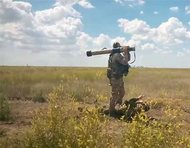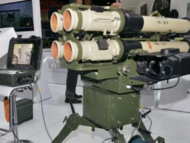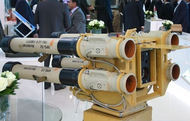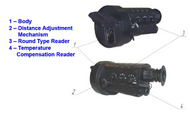RAS-16
| RAS-16 | |
|---|---|
 A RAS-16 | |
| Type | Rocket-propelled grenade |
| Place of origin | |
| Service history | |
| In service | 2016–present |
| Used by | See Users |
| Wars | The Deluge |
| Production history | |
| Designer | FNC |
| Designed | 2012–2016 |
| Manufacturer | FNC |
| Produced | 2016–present |
| Specifications (RAS-16) | |
| Mass | 2 kg (4.4 lb) empty 8 kg (18 lb) loaded |
| Length | 1200mm |
| Diameter | 105mm |
| Warhead | 750mm RHA penetration 650mm RHA penetration after ERA with Tandem HEAT |
Detonation mechanism | Impact fuze |
The RAS-16, short for the Burgoignesc Roquette Antichar System modèle 16, literally "Rocket Anti-Tank System model 16", is a Yonderian handheld rocket-propelled grenade launcher designed by Fabrique Nationale Collinebourg. Introduced in 2016, it is the primary RPG of the Yonderian Defence Force, superceding the RAS-88 and supplementing the lighter single-shot disposable RAS-66. The RAS-16 fires either a tandem 72mm/105mm HEAT warhead for anti-armour purposes or a 105mm thermobaric warhead for anti-personnel use.
Despite its overall length of 1.2 meters, a loaded RAS-16 weighs only 8 kg (18 lb) which is equivalent to many modern single-shot disposable RPGs, but offers more than twice the effective range and greatly increased post-armoured interface effectiveness. The RAS-16 also has a built-in laser rangefinder for greatly increased first shot hit probability.
With the infantry of the Yonderian Defence Force, the RAS-16 is generally deployed as a two-man weapons team inside a regular infantry squad, with the gunner carrying the weapon and two spare rounds (typically two HEAT and one thermobaric) and the loader carrying a further three rockets (typically another two HEAT and one thermobaric), with more ammunition carried in their vehicle. They are also used as remote-operated sentry guns or vehicle-mounted turrets, with four tubes mounted together 2x2 with a thermal laser rangefinder.
Development history and design features

Development of the RAS-16 began in 2012 by a Fabrique Nationale Collinebourg design team led by Rachet Couronne in response to the recent adoption of the MAS-12 ATGM. The RAS-88 RPG in use at the time, also a product of FNC, was slowly approaching obsolescence despite repeated upgrade kits to prolong its service life. Further funding for development was secured from the Yonderian Defence Force via AMY in 2013, with Army Procurement Command keen on keeping the Yonderian Defence Force on top of anti-armour capabilities in case of war. The first functional prototypes entered testing in Autumn of 2015 and the weapon was approved after tweaking in the Spring of 2016.
The RAS-16 is a shoulder-fired, unguided, tube-style, breech-loading anti-tank rocket system with an effective range of 800 meters designed to take on and destroy modern and future tanks equipped with explosive reactive armour. The RAS-16 is designed with economic viability in mind, keeping production cost as low as possible while maintaining a high degree of effectivenes on target. When launched, the rocket deploys eight fins as it leaves the launcher, stabilizing the rocket during flight.
The RAS-16 aims through an optical sight with 2.7x magnification wtih night-vision capability. A laser rangefinder is also built into the optical sight of the RAS-16, with which it can accurately find ranges out to approximately two kilometers, 600 meters beyond the maximum firing range of the RAS-16. Both the thermobaric and tandem HEAT warheads of the RAS-16 are deliberately designed to have the same flight path, simplifying the aiming process by eliminating the need for seperate range tables in the optical sight's reticle.
The reticle of the RAS-16's optic is graduated in hundreds of meters from 100 to 800 meters to account for gravitational influence on the warheads, and the sight places a red dot at the correct range in the reticle once the laser rangefinder has been used to designate a target. The RAS-16 furthermore has a programmable fuze setter to allow warheads to explode in mid air at a set distance. For added safety and cost savings, an automatic round counter enables soldiers and logisticians to accurately track the service life of each weapon.
Ammunition
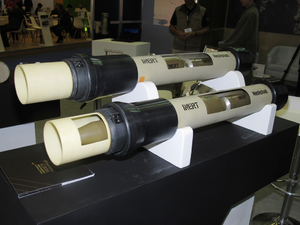
Tandem HEAT warhead
The armour piercing ammunition of the RAS-16 is its tandem HEAT warhead featuring a 72mm charge in front of a 105mm charge. The 72mm precursor charge at the tip of the rocket is designed to hit the explosive reactive armour of its intended target and detonate it before the main charge hits. The reactive armour plate should deploy, exploding and disrupting the precursor charge's HEAT jet. As reactive armor is usually single usage only, this renders that particular block of reactive armor useless and unable to protect against the much larger and more powerful main shaped charge. The main shaped charge is a full calibre 105mm warhead supposed to penetrate the target through the weak spot created by the precursor charge. It is also capable of penetrating two metres of brick or 1.5 m of reinforced concrete.
Thermobaric warhead
The anti-personnel rocket used in the RAS-16 is a thermobaric warhead. While most conventional explosives consist of a fuel–oxidizer premix, thermobaric weapons consist only of fuel and as a result are significantly more energetic than conventional explosives of equal weight. Their reliance on atmospheric oxygen makes them unsuitable for use under water, at high altitude, and in adverse weather, but makes them considerably more effective when used in enclosed spaces such as tunnels, buildings and non-hermetically sealed field fortifications such as foxholes, covered slit trenches, bunkers. It has a lethal radius of 12 meters and contains 2.2 kg (4.9 lb) of thermobaric mixture, with an explosive yield roughly equal to that of 9 kg (20 lb) of TNT.
Operational History
The Yonderian Defence Force began taking delivery of RAS-16s in the Summer of 2016 which began the process of replacing the present RAS-88s. RAS-16s are deployed with the YDF on several different platforms including shoulder-borne and quad-stacked for vehicular or remote controlled mounts. The RAS-16 has seen combat use in the Deluge, particularly during the Final War where it has proven itself very a very capable and reliable means of destroying Varshani heavy vehicles. It is used both in the ground role as a shoulder-fired weapon, on quadropedal mounts as remotely-operated sentry guns and mounted to vehicles.
Users
Gallery
- RAS-16
-
YDF trooper with RAS-16
-
Remote-operated quad mounted RAS-16s with thermal laser rangefinder
-
Quad-monted RAS-16s for vehiclar use, marketed internationally as Combat Remotely Operated Weapon Station (CROWS)
-
RAS-16 laser rangefinder
